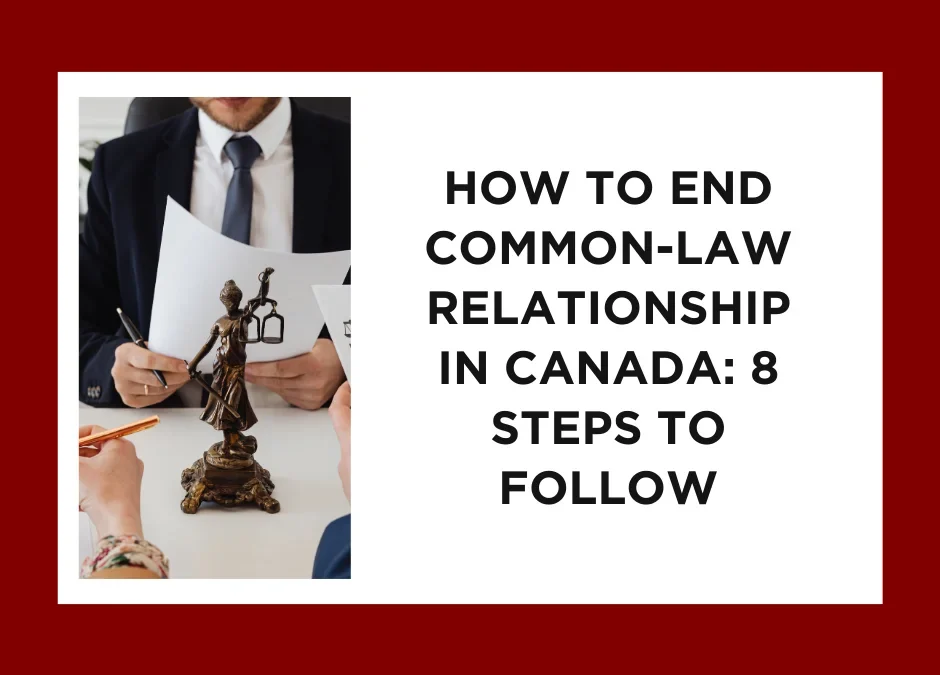Traditional marriages and common-law partners have different rights and laws that you must follow in the event of a common law separation Ontario.
We understand things can go downhill, but it is important to follow the right steps when dissolving your partnership.
So, if you are living with your partner in a common-law relationship and you want to know how to end common-law relationship in Canada, keep reading for a complete guide.
What is Considered a Common-Law Relationship in Canada?
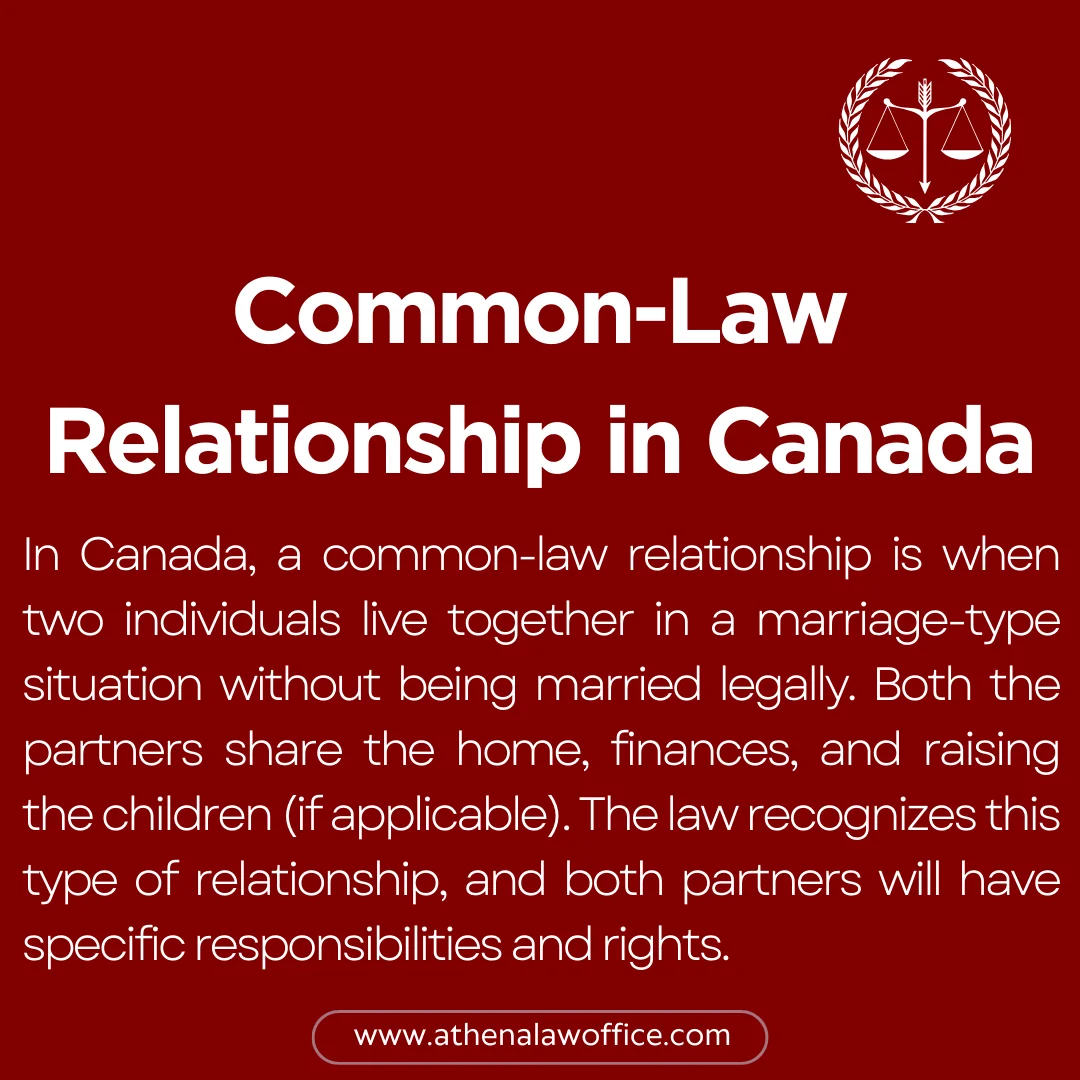
In Canada, a common-law relationship is when two individuals live together in a marriage-type situation without being married legally.
Both the partners share the home, finances, and raising the children (if applicable). The law recognizes this type of relationship, and both partners will have specific responsibilities and rights.
Please note that a common-law relationship is different than a domestic partnership. You can learn more about a domestic partnership on our blog.
Common-Law Relationship vs. Legal Marriage
It is important to know the key differences between a common-law relationship and a traditional legal marriage. Here are some of the top differences between the two:
- Tax implications and filing status
- Spousal support entitlements. You can learn about spousal support in legal marriages on our blog
- The division of property. Learn about the equalization of net family property here
- Ways of how to end a common-law relationship differ from a divorce
- Entitlement to survivor benefits
In these ways, a common-law relationship is significantly different than a traditional marriage. Knowing these differences will help you understand what this type of relationship entails.
Does Your Relationship Qualify as Common Law in Canada?
Before we move on to how to end a common-law relationship, it is important to understand whether your relationship will qualify as common law where you live.
We have divided the eligibility criteria based on provinces to help you understand this better:
| Province or Territory | Qualifying for Common-Law Relationship |
| Ontario | You must be cohabiting for three years or have a kid together, and the relationship must be of some permanence |
| Alberta | The province doesn’t recognize common law. Instead, they have categorized a similar relationship as adult interdependent partners. You must be living together for three years by entering into an agreement |
| Manitoba | A cohabitation of three years or a year if you have a child with the partner |
| British Columbia | A cohabitation of two years |
| Nova Scotia | A cohabitation of two years |
| Newfoundland | Cohabitation of one year and a child together |
| New Brunswick | Continuous cohabitation for three years and one person must be significantly dependent on the other or living together for one year and having a child |
| Quebec | Quebec follows a civil code and doesn’t recognize common-law partnerships. |
| Yukon | You must be living together in a relationship of some permanence |
| Saskatchewan | Continuous cohabitation for 2 years |
If you want more clarification regarding common-law relationship in your province, we recommend getting in touch with a family lawyer. They will explain to you in more detail whether you qualify for a common-law relationship.
How to End Common-Law Relationship in Canada: 8 Steps to Follow
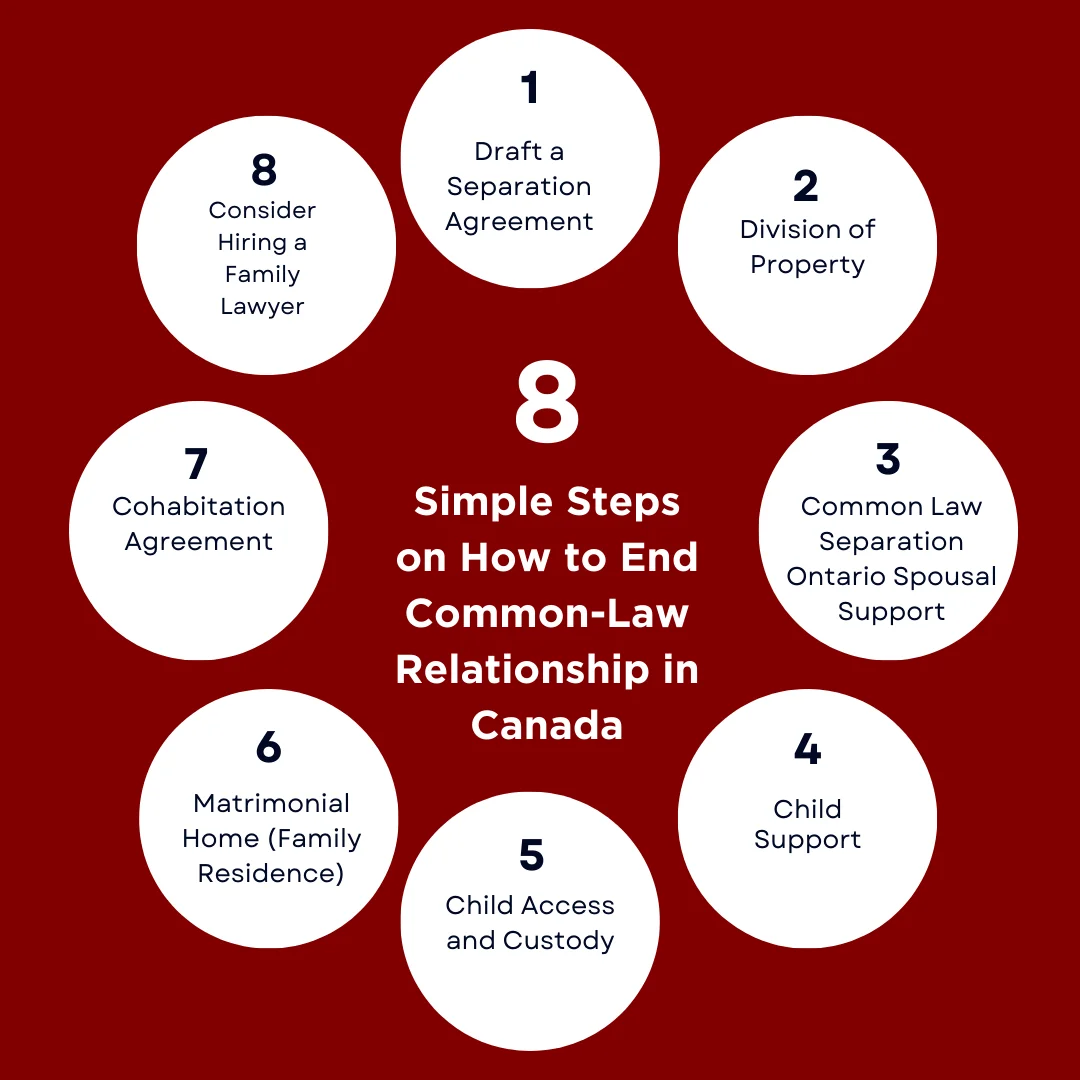
Now that you have some basic idea about a common-law relationship in Canada, it is also important to know how to end it. After all, you can’t do a divorce like a traditionally married couple.
So, here are the steps you must follow to learn how to end a common-law relationship in Canada:
1. Draft a Separation Agreement
The first thing you must do during your common law separation in Ontario is to create a separation agreement. While the general format will be the same as a traditional separation agreement in Ontario, there will be some differences as to how everything will be divided between you and your partner.
You can create your own separation agreement, but we recommend you get independent legal advice and get it reviewed by a family lawyer. They will make sure it meets the criteria of contract law and that it is fair to both parties.
Then, you can sign the agreement and file it with the court to make it legally binding.
2. Division of Property
The first thing you can include in the agreement of common law separation Ontario is how you will divide property between you and your partner when learning how to end common-law relationship in Canada
Part 1 of the Family Law Act only applies to legally married couples. Unmarried couples are not legally entitled to divide their property.
Because of this, each partner will only be entitled to what they brought into the common-law relationship. So, you can keep the property that you brought into the relationship when it began.
While you can’t divide the property, you can still agree to these things during common law separation in Ontario:
- Who will stay in the house both of you were cohabitating in
- How to divide the house if both partners bought it in a joint venture
- Dividing the expenses and debts
- Dividing other property and furniture that belongs to both partners
It can be difficult to figure out who owns what and how everything will be divided during common law separation Ontario. We recommend you hire a family lawyer to help you understand the division and divide everything in the right manner.
3. Common Law Separation Ontario Spousal Support
Spousal support is perhaps one of the biggest concerns during a common law separation Ontario. The reason for this is that one partner may rely financially on the other during the partnership.
Part 3 of the Family Law Act governs support payments and also applies to common-law partners who have been living together for three years or more while being in a relationship of some permanence or having an adopted child together.
If your relationship meets the criteria stated in this part of the Family Law Act, then you might be entitled to some spousal support or have to pay the other party.
Spousal support for common-law couples is calculated in the same way as that of married couples, but married couples claim spousal support under the Divorce Act.
The exact amount of spousal support for your common-law relationship will depend on the specifics of your case. So, it is best to consult with a lawyer to determine what you can expect.
4. Child Support
Child support is another matter that is of importance during the common law separation Ontario. Every parent is under a legal duty to support their dependent children.
In a common-law separation, you will have to calculate child support the same way as in a married relationship. You will have to go through the Child Support Guidelines to determine how much support to pay.
On the other hand, if your common-law partner has a child from a previous relationship who has been living with you, then you may also be considered a parent for that child while calculating child support.
So, anyone that the court finds has acted as a parent to the child may be obligated to pay child support.
5. Child Access and Custody
As a parent, you can apply for access or custody of your child (now called parenting time and decision-making responsibilities, respectively). Married couples will apply for this under the Divorce Act.
However, unmarried couples such as common-law partners will have to apply under the Children’s Law Reform Act (CLRA). This Act applies to any couple that has been cohabitating together and have children.
If you want to understand this in-depth, we recommend you get in touch with our family lawyer to determine how to apply for custody and access during common law separation Ontario.
6. Matrimonial Home (Family Residence) in a Common-Law Relationship
The issue of the matrimonial home is an important one during a traditional divorce. However, common-law partners don’t have the equal right to possess the matrimonial home in the event of a separation.
It is divided just like any other property, as the matrimonial home belongs to the person who purchased it and whose name is there on the title or the lease (in the event of a lease).
If you own the matrimonial home, then you have the legal right to kick out your common-law partner when your relationship breaks down. However, if there is abuse in the relationship, then we recommend you don’t take this step, as your safety will be compromised.
On the other hand, if your common-law partner is less financially stable than you, even then we recommend you don’t take this step. The courts will not take this kindly, and it will only hurt your case.
If your partner is applying for spousal support, then your behavior regarding the home will influence the decision of the court to award spousal support to your partner.
7. Take the Cohabitation Agreement into Account (If You Have One)
In the event of a common law separation Ontario, you might have created a cohabitation agreement before you got together. If that is the case with you, then we recommend you go back to this agreement to determine the terms and conditions of your agreement.
It is important to note that cohabitation agreements can’t decide child custody or access matters. You will have to decide on these matters once you are separating from your spouse.
Cohabitation agreements can only protect your rights within the relationship, which is why it is important to have such an agreement beforehand.
8. Consider Hiring a Family Lawyer
Finally, we recommend you hire a family lawyer to understand your legal rights and obligations. They will let you know the best course of action for your situation and provide you with independent legal advice.
They can also help you draft agreements and ensure they will be enforced if the relationship breaks down. So, be sure to consider hiring a family lawyer if you want to get a favorable outcome for your case.
What is a Common-Law Spouse Entitled to in Ontario?
Common-law partners are entitled to spousal support if the relationship ends, along with sharing property rights and benefits, such as insurance and pension.
You can go through the Family Law Act, as it states the spousal support guidelines for common-law partners. Please note that common-law partners are not automatically entitled to property or inheritance rights.
How to Evict a Common Law Partner in Ontario?
It is important to understand that common-law partners don’t have a matrimonial home. This means that if the house you are living in with your partner is in your name, then it is solely yours.
So, yes, you can technically evict your partner, but we recommend against this step. The court will not take this kindly, and such a harsh action will not be a good look for you during the case.
In the long run, it will hurt your case and will do more harm than good. If you want to know more about this, you can get independent legal advice from our family lawyer in Ontario to take the right steps during common law separation Ontario.
FAQs
How do you break common-law in Canada?
Draft a separation agreement and hire a lawyer to learn how to end common-law relationship in Canada. For more information, you can get independent legal advice from our family lawyers.
How do you separate respectfully?
Talk to your partner, define the terms of separation, and opt for mediation or hire a lawyer to separate respectfully from your common-law partner.
Do common law partners have rights in Canada?
Yes, common law partners have certain rights, depending on the province or territory you live in. Check the rights in your province, and then get a lawyer to opt for common law separation Ontario respectfully.
Can a common-law partner take half in Ontario?
A common-law partner can’t take half of the property in Ontario in a common-law relationship. The property division provisions in the Family Law Act only apply to married couples, not common law. So, if you have brought something into the partnership, you will be entitled to that only.
Final Thoughts
Now that you know how to end common-law relationship in Canada, you can take these steps to opt for a common law separation Ontario. If you need more clarification regarding this, you can contact our family lawyer to learn more.
We will guide you through this process and provide you with a comprehensive overview of what you must do.
Author Profile

- Barnett Law is a trusted and knowledgeable lawyer in Scarborough. Her expertise spans real estate law, family law, adoptions and fertility law. A lawyer by profession and a humanitarian by heart, Athena Narsingh Barnett wants to help people become more familiar with the legal system and be well-informed to make important legal decisions.
Latest entries
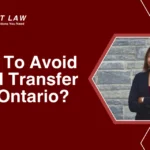 legal guidanceNovember 12, 2025How To Avoid Land Transfer Tax Ontario?
legal guidanceNovember 12, 2025How To Avoid Land Transfer Tax Ontario?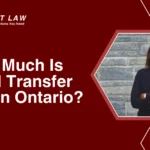 legal guidanceOctober 31, 2025How Much Is Land Transfer Tax In Ontario?
legal guidanceOctober 31, 2025How Much Is Land Transfer Tax In Ontario?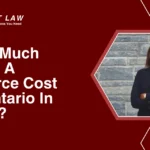 Family LawOctober 27, 2025How Much Does A Divorce Cost In Ontario In 2025?
Family LawOctober 27, 2025How Much Does A Divorce Cost In Ontario In 2025? Family LawOctober 22, 2025Divorce Rate In Canada 2025: Top Divorce Statistics To Know
Family LawOctober 22, 2025Divorce Rate In Canada 2025: Top Divorce Statistics To Know


